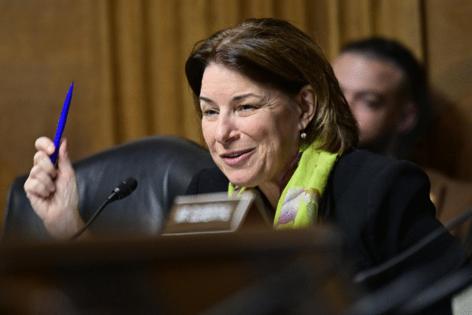Capitol Police close out post-Jan. 6 recommendations, call for more manpower
Published in News & Features
WASHINGTON — Capitol Police have come a long way since Jan. 6, 2021, Sen. Amy Klobuchar said as she chaired her last Senate Rules Committee hearing.
“We know we have challenges, but I do think it’s important to acknowledge the progress,” the Minnesota Democrat said at the oversight hearing Wednesday.
The police department has closed out all post-Jan. 6 inspector general recommendations and is exceeding hiring goals, Chief J. Thomas Manger told senators. He painted a picture of a force that has moved into a different era after struggling in the wake of the Jan. 6 attack on the Capitol.
“If there were two things that I was trying to do … it was first to restore the sense of safety to the people who worked here … and also to regain the confidence of the men and women of the Capitol Police,” said Manger, who became chief in July 2021. “Because I think both of those things were harmed and, in fact, destroyed, four years ago.”
There was no shortage of goodwill at the hearing, as Klobuchar reminisced about her four years at the helm of the committee and Manger thanked her and ranking member Deb Fischer, R-Neb., for their leadership.
Despite the warm reception, the department still faces its share of internal issues, like burnout and low morale, as well as public perception. As its budget has ballooned, critics have noted a perceived lack of transparency, including the stifling of Capitol Police inspector general reports, which until recently were largely unavailable to the public.
The post-Jan. 6 recommendations have themselves been a pain point for the department. Last year, lawmakers on the House Administration Committee questioned former Capitol Police Inspector General Ron Russo about some recommendations marked as closed though they had not been fully completed.
The more than 100 total recommendations ranged from better communication between department leadership and officers, to better equipment and training, to clearer procedures for special events. Notably, and despite a dip in the total number of officers following Jan. 6, Manger testified that the force now has over 350 more sworn officers than it did before the 2021 attack.
But more manpower is still needed, according to Manger and Officer Gus Papathanasiou.
Papathanasiou, who leads the Capitol Police union, did not testify at the hearing but was present for Manger’s testimony. Afterward, he said he largely agreed with Manger’s assessment of the department, but that officers were still struggling with burnout. A new threat environment, with lawmakers being swatted at their homes at alarming rates — Manger counted more than 50 in the last month — has only made things harder for the rank-and-file.
“I think there’s still a lot more work to be done, like the chief said, and there still needs to be a better work-family balance,” Papathanasiou said. “The critical mission is here on the Hill, and we’re spread across the country now. If you’re taking bodies here to put on DPD [Dignitary Protection Detail], all you’re doing is lessening the manpower here.”
But, generally, Papathanasiou agreed the force is stronger today than it was four years ago, and lawmakers apparently concurred, noting a flurry of laws passed after Jan. 6 aimed at warding off future incidents.
Klobuchar, who is set to hand off the Rules gavel to former Senate Majority Leader Mitch McConnell as Republicans take control of the chamber next year, touted a measure signed into law in 2021 that allows the police chief to call directly for support from the D.C. National Guard or federal agencies without prior approval from the Capitol Police Board.
She also noted legislation that empowers Congress to hire or fire the Architect of the Capitol, after the previous person to hold the job, J. Brett Blanton, faced scrutiny for failing to respond to the Capitol on the day of the attack, as well as a series of other ethical misdeeds exposed in a 2022 inspector general report. President Joe Biden removed Blanton in February 2023. Klobuchar also cited a measure known as the Electoral Count Reform Act, which became law in 2022 and makes it more difficult for Congress to object to electoral college results.
“Putting aside people’s different views on what happened [on Jan. 6], everyone knows there are ongoing threats right now and there are major, major challenges, and that the police are better equipped to deal with that now than they were four years ago,” Klobuchar said ahead of the hearing.
The changing nature of those challenges continues to vex lawmakers and police. According to Capitol Police data, there were 8,008 threats investigated in 2023, up from 5,206 in 2018. In November alone, the department tallied more than 700 threats that must be addressed by roughly 20 threat investigation agents, with another eight graduating out of training soon.
“Who knew that threats would go through the roof? Who knew that the tactics [of] folks that want to disrupt the lives and disrupt the work of members of Congress, would result in having 50 people swatted in the last month, people disturbed in the middle of the night in their homes?” Manger said. “The heightened threat level in this country has not gone down, and so we do need additional resources.”
©2024 CQ-Roll Call, Inc., All Rights Reserved. Visit cqrollcall.com. Distributed by Tribune Content Agency, LLC.







Comments